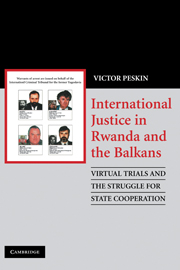 International Justice in Rwanda and the Balkans
International Justice in Rwanda and the Balkans Book contents
- Frontmatter
- Contents
- Maps and Timelines
- Acknowledgments
- Permissions
- Note on Pronunciation
- MAP 1 Map of the Former Yugoslavia
- MAP 2 Map of Rwanda
- PART I INTRODUCTION
- PART II THE BALKANS: STRATEGIES OF NON-COMPLIANCE AND INSTRUMENTS OF PRESSURE
- PART III RWANDA: VIRTUAL TRIALS, INTERNATIONAL JUSTICE, AND THE POLITICS OF SHAME
- 6 The Struggle to Create the International Criminal Tribunal for Rwanda
- 7 “Trials of Cooperation” and the Battles for Karamira and Barayagwiza
- 8 Investigating Rwandan Patriotic Front Atrocities and the Politics of Bearing Witness
- 9 Victor's Justice Revisited: The Prosecutor v. Kagame
- PART IV CONCLUSION
- Bibliography
- Index
6 - The Struggle to Create the International Criminal Tribunal for Rwanda
Published online by Cambridge University Press: 05 September 2012
- Frontmatter
- Contents
- Maps and Timelines
- Acknowledgments
- Permissions
- Note on Pronunciation
- MAP 1 Map of the Former Yugoslavia
- MAP 2 Map of Rwanda
- PART I INTRODUCTION
- PART II THE BALKANS: STRATEGIES OF NON-COMPLIANCE AND INSTRUMENTS OF PRESSURE
- PART III RWANDA: VIRTUAL TRIALS, INTERNATIONAL JUSTICE, AND THE POLITICS OF SHAME
- 6 The Struggle to Create the International Criminal Tribunal for Rwanda
- 7 “Trials of Cooperation” and the Battles for Karamira and Barayagwiza
- 8 Investigating Rwandan Patriotic Front Atrocities and the Politics of Bearing Witness
- 9 Victor's Justice Revisited: The Prosecutor v. Kagame
- PART IV CONCLUSION
- Bibliography
- Index
Summary
Introduction
The United Nations' first ad hoc war crimes court – the International Criminal Tribunal for the Former Yugoslavia (ICTY) – seemed, unsurprisingly, destined to be mired in conflict with the Serbian and Croatian governments that had instigated the Balkan wars in the first place. But the UN's next attempt to establish an international tribunal, in the aftermath of the Rwandan genocide, promised a much brighter future for cooperation with a state whose government leaders represented the victims. Whereas the ICTY was cast as a natural enemy of Serbs and Croats, the International Criminal Tribunal for Rwanda (ICTR) seemed poised as a likely friend of the new Tutsi-led Rwandan government that brought the 1994 genocide to a halt and took power in its aftermath. The potential for a strong alliance between the Kigali government and the ICTR could be seen in the confluence of Rwandan government and international interests in prosecuting the Hutu architects of the genocide. Despite this convergence, the tribunal–government relationship was often marked by rancor and bitterness. From the start, the threat of state non-compliance loomed. Disagreement over the blueprint for the new court prompted Rwanda, which happened to hold a temporary seat on the Security Council at the time, to cast a dissenting vote against authorizing the establishment of the tribunal. Even after the authorization, tribunal officials and diplomats feared that Rwanda might withhold vital assistance and disrupt the court's work.
- Type
- Chapter
- Information
- International Justice in Rwanda and the BalkansVirtual Trials and the Struggle for State Cooperation, pp. 151 - 169Publisher: Cambridge University PressPrint publication year: 2008


